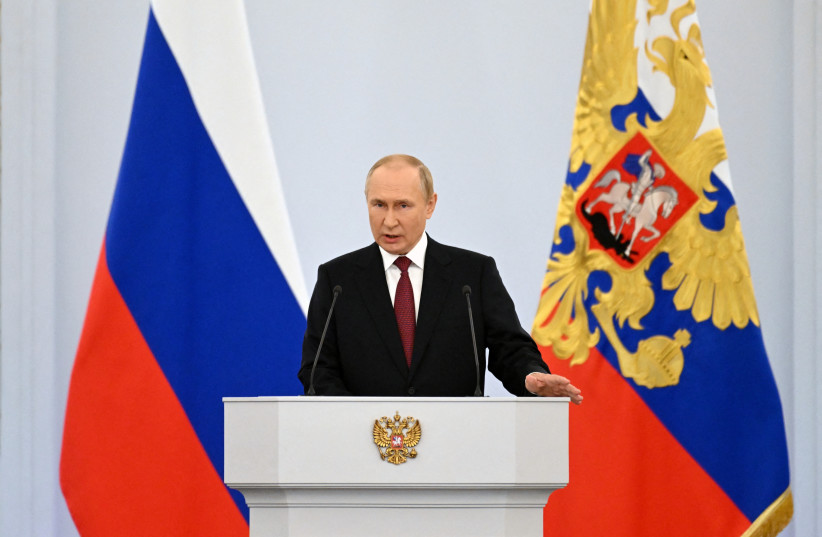The United Nations General Assembly overwhelmingly condemned Russia's September annexation of four Ukrainian regions in a 143-5 vote, with 35 abstentions.
"The world had its say," a grateful Ukrainian President Volodymyr Zelensky tweeted after Wednesday's vote. The Russian Federation's "attempt at annexation is worthless [and] will never be recognized by free nations. [Ukraine] will return all its lands," he stated.
Ukrainian Foreign Minister Dmytro Kulebasaid added that "The demand is clear: Russian decisions on attempted annexation must be reversed; Russia must withdraw its forces from all of Ukraine’s territory."
Only Belarus, North Korea, Nicaragua and Syria stood with Russia.
Iran ducked the issue and was absent from the vote; China and India were among those that abstained.

All Western states, including Israel, stood with Ukraine.
The United States led the drive to condemn Moscow at the General Assembly after Russia blocked any UN Security Council action on the matter.
'A monumental day for the UN'
"Today was a monumental day for the United Nations," tweeted US Ambassador to the UN Linda Thomas- Greenfield, adding that "in the eyes of the world, Ukraine's borders remain the same."
In her speech to the plenum, she said that the global community could not afford to turn a blind eye to Russia's annexation of four Ukrainian regions last month — Donetsk, Luhansk, Kherson and Zaporizhzhia.
The UN's credibility and with it, the international world order, were at stake, she said.
"The UN was built on an idea: that never again would one country be allowed to take another country’s territory by force – in the wake of World War II," Thomas-Greenfield said.
"'The UN will not tolerate attempts at illegal annexation. We will never recognize it," she stated. "These United Nations will not tolerate seizing a neighbor’s land by force. We will stand up to it. These United Nations will not tolerate the destruction of the UN Charter. We will defend it.
"Our message is loud and clear: It does not matter if you as a nation are big or small, rich or poor, old or new. If you are a UN Member State, your borders are your own and are protected by international law. They cannot be redrawn by anyone else by force," Thomas-Greenfield said.
The US and other Western countries lobbied ahead of Wednesday's vote. US Secretary of State Antony Blinken convened a virtual meeting on Tuesday with diplomats from more than 100 countries.
Russian Ambassador Vassily Nebenzia charged that it was Western countries that were destroying global order by abusing the UN platform to pursue their own geopolitical interests, particularly Washington.
The US and others speak of territorial integrity only when it suits their interests, Nebenzia said. In recent days the West, "driven by neocolonial instincts, unleashed an unprecedented campaign of blackmail and arm twisting against developing states," he charged.
Countries were "literally besieged by US political emissaries and their allies, who directly threatened punishment and consequences for disobedience," he said.
Moscow in September proclaimed its annexation of four partially occupied regions in Ukraine - Donetsk, Luhansk, Kherson and Zaporizhzhia - after staging what it called referendums. Ukraine and its allies have denounced the votes as illegal and coercive.
The resolution condemned that referendum said Moscow in September proclaimed its annexation of four partially occupied regions in Ukraine - Donetsk, Luhansk, Kherson and Zaporizhzhia - after staging what it called referendums. Ukrainian allied denounced the referendum as illegal and coercive.
The resolution that the UNGA — a body of 193 member states — approved on Wednesday, echoed that sentiment. It stated that the referendum "had no validity under International law" and could not form the basis for altering Ukraine's borders. It also called on UN member states 'to refrain from any action or dealing that might be interpreted as recognizing any such alternated state." It also called on Russia to withdraw its troops from Ukraine.
The UNGA vote mirrored what happened in 2014 after Russia annexed Ukraine's Crimea. The General Assembly then adopted a resolution declaring the referendum invalid with 100 votes in favor, 11 against and 58 formal abstentions.
Global concern has grown since then. In February of his year, 141 countries voted to denounce Russia and demanded it withdraws its troops from Ukraine within a week of its Feb. 24 invasion.
Reuters contributed to this report.
